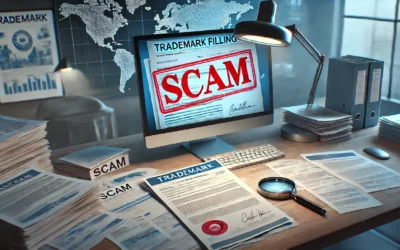A trademark cannot be registered if it’s deceptive or misleading. In a way, this is the other side of the coin of descriptive trademarks. A trademark that describes the product or service, cannot be registered. Conversely, if the trademark gives wrong information about the product or service, it cannot be registered either. So what’s a “deceptive” trademark, and how to spot one?
What’s a “deceptive trademark”
Trademark is deceptive, if it is “of such a nature as to deceive the public, for instance as to the nature, quality or geographical origin of the goods or service”. In practice, this means that it gives the wrong impression about the products or services covered by the mark.
There are two components for a mark to be considered deceptive. Firstly, it must give a specific, clear, and unambiguous message about the nature, quality of characteristics of the goods or services in question. Secondly, there is a serious risk that the relevant public might rely on that message and purchase goods or services in the mistaken belief that they possess a certain characteristic they do not have.
If the mark has several meanings, it can be considered deceptive even if only one of those meanings is deceptive.
The rule against allowing the registration of deceptive trademarks is to protect the consumers. As a corollary rule, most countries have laws prohibiting misleading advertising.
Examples
Here are some contrasting real-life examples from the world of coffee:
FRANKLIN COFFEE HOUSE. The registration was accepted for coffee and other drinks because coffee houses are places that serve not only coffee but other beverages and snacks as well.
FABRICCA COFFEE N’ BITES. The registration was accepted for coffee and other drinks because the mark gives the impression that coffee is not the only product under that mark.
DOLCE BACIO FLAVORED COFFEE. Objected for non-coffee drinks. The mark makes a clear and specific reference to coffee. For non-coffee drinks, the mark was considered deceptive.
BOLD COFFEE. Refused for non-coffee drinks because of deceptiveness.
Other examples of refused marks include LACTOFREE for lactose, BUFFALO BEEF for poultry, and JUST EGG for egg substitutes.
In most cases, deceptiveness relates either to the nature or quality of the goods or services. Although “geographical origin” is mentioned together with the nature and quality of the goods in the EU trademark regulation, the EUIPO will not normally refuse a trademark on the basis that it is geographically deceptive.
If the mark contains the element “MADE IN USA”, the EUIPO will not object to that, unless the list of goods is drafted in a way that non-deceptive use is not possible. For example, it the mark covers “clothing made in China”, the mark is considered deceptive. If it only covers “clothing”, no objection is raised.
Also, mark MONT BLANC is not deceptive for pens, because consumers would not realistically think the pens are made on the Mont Blanc mountain.
Is it possible to circumvent the deceptiveness?
Sometimes it is possible to leave the deceptive element from the mark. If we take the example of BOLD COFFEE above, the term “coffee” is either completely descriptive (coffee products) or deceptive (non-coffee products). The dominant and distinctive element in the mark is the word BOLD. The word “coffee” adds very little to the mark. The brand could be registered as “BOLD” and it could be used together with descriptive and non-deceptive elements (BOLD coffee, BOLD tea, etc). In fact, even large companies use this kind of naming strategy, think of Google Maps, Google Music, Google Calendar, Google Analytics, etc.
It often makes sense to omit purely descriptive elements from the mark, and where there is a risk that the descriptive element might be deceptive for some goods and services, this is yet an additional reason not to include it in the application.
Another issue that can sometimes be used to overcome the deceptiveness issue is to use broad terms. For example, JAPAN WHITE has been considered deceptive for “brown rice”, but ok for rice. The term “rice” covers all types of rice, including brown rice. For drinks, mark EASY SODA was not accepted for still waters, but it would be ok for “non-alcoholic beverages”, a term that covers also still waters.
The EU office will not refuse registration if the application covers broad terms, where the mark could be deceptive for part of those broad terms. Sometimes this can be used to overcome the deceptiveness issue.
Conclusion
If a trademark gives concrete, specific, and unambiguous false information about the products covered by the trademark, it cannot be registered. However, there are some strategies that can be used to avoid this, such as omitting the deceptive/descriptive part and formulating the list of goods and services with the broadest acceptable terms.
Read also
How to register a descriptive name as a trademark?
Slogans as trademarks



